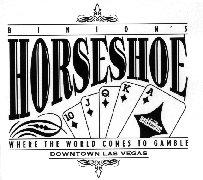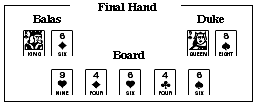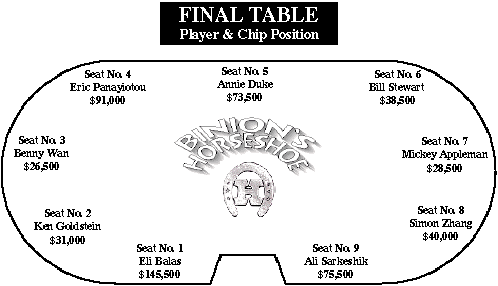

|
Volume 30 • Number 13 • May 9, 1999 |
| previous event |
| next event |
1999 Champion
ELI BALAS
Event #13 Results
Texas Hold'em (Limit)
$5,000 Buy-in
| 1. Eli Balas | $220,000 |
| Las Vegas NV | |
| 2. Annie Duke | 110,000 |
| Columbus MT | |
| 3. Ali Sarkeshik | 55,000 |
| Northampton, UK | |
| 4. Eric Panayiotou | 33,000 |
| Tom's River NJ | |
| 5. Mickey Appleman | 24,750 |
| Ft Lee NJ | |
| 6. Benny Wan | 19,250 |
| South San Francisco CA | |
| 7. Ken Goldstein | 13,750 |
| Los Angeles CA | |
| 8. Bill Stewart | 11,000 |
| Atlantic City NJ | |
| 9. Simon Zhang | 8,800 |
| Lowell MA | |
| 10. Ted Forrest | 6,600 |
| 11. Jamie Hettner | 6,600 |
| 12. Dennis Seagle | 6,600 |
| 13. Gerald Badgett | 6,050 |
| 14. Patrick Bruel | 6,050 |
| 15. Daniel Barnett | 6,050 |
| 16. Harry Thomas | 5,500 |
| 17. Erik Seidel | 5,500 |
| 18. Alex Brenes | 5,500 |
Total Prize Pool: $550,000
Number of Entrants: 110
Entries to Date: 2,735
Prize Money to Date: $6,911,500

SEMI-BLUFF PAYS OFF FOR
LAS VEGAS PRO ELI BALAS
To get there, he first had to duke it out with Annie Duke, housewife/pro and mother of two young children, playing on Mother's Day. When the game got to two-handed, Balas had $350,000 to her $200,000. Duke suddenly got hot and was closing in on him. Then, with the board showing J-7-6-K, Duke had two pair, while all Balas had was a 9-8 for an open-end straight draw. He bet into her, hit a five on the end to complete his straight, and pulled in a $200,000 pot. That was the turning point and he never looked back after that.
It was not an easy victory for Balas. At the $400-$800 level he had only $500 left. "But I hung on, and very slowly worked my way up," he said. Asked why he mucked eight straight hands right after he and Duke got heads-up, he explained that she was hitting hands, so he decided to slow down for a while.
This is the 14th time in the money and the seventh final finish at the WSOP for the 33-year-old Duke, who calls Columbus, Montana home. She came in second once before, in stud. "I was really lucky several times, and had some bad things happen a few others. I had him trapped with my two pair against his nine-high; he was a 6-1 dog and I would basically have had all the chips. But I also got a lot of cards, like aces when I was all in once, so I'm very happy."
At the final table, Ken Goldstein, a poker player from Los Angeles, quickly got in trouble and went all in almost immediately, but survived when his A-K turned into a flush. He escaped a while later when he went in with K-J against the two tens held by Eric Panayiotou, a New Jersey businessman originally from Cyprus, Greece. He flopped a king and outran him. The first big pot came when Balas, in a preview of things to come, started with Q-10 in four-way action, flopped a straight draw and completed it on the end.
Simon Zhang, a poker player from San Francisco, was the first player out. He was down to about $11,000 after Duke, with pocket jacks, picked off his attempted bluff. A short time later, holding K-2, Simon says he's all in. Panayiotou, with A-10, turns a second ace, and Simon is all out. Immediately after, Bill Stewart, a veteran poker player with a $500 limit hold'em victory at the Hall of Fame, is next out. He puts his last hopes on an A-Q, but Panayiotou has an A-K. He can't improve and now seven are left.
A couple of heartbeats later, it's Goldstein's turn to visit the pay window. He has a pair of eights and Balas has a pair of tens. The good news for Goldstein is that the first card he sees on the flop is an eight; the bad news is that the second one is a 10. It's set over set and the sun sets on his chances because he doesn't catch a miracle fourth eight.
Now Duke goes all in on a raise, but no one calls her. Later, she gets involved in a pot with Benny Wan. He makes a play that would be brilliant if it worked, less brilliant if it didn't. With a board of 7-5-2, he check-raises Duke on the flop. She calls with A-9. When a deuce hits the turn and an ace on the river, he check-raises her again with the last of his chips. She calls, and all he has is a Q-8! Call it less brilliant.
After more action, Mickey Appleman, holder of three WSOP bracelets, goes all in with A-4 of diamonds against pocket fives held by Ali Sarkeshik of Northhampton, UK by way of Iran. Two diamonds flop, but Appleman escapes the hard way, by hitting two running fours. Soon after he gets busted when he raises all in with A-10 against Panayiotou, who flops a set of fours.
Now Balas, who started with the chip lead, continues to build his stacks when he makes a flush against Panayiotou's aces and 10s. Low on chips, Eric manages one escape when his 9-7 turns into a straight on the end. But then Balas busts him with just a 7-3 and one spade, when three spades flop and a fourth comes on the turn. Annie then finishes off Sarkeshik. He's in the $6,000 big blind with 10-8; she raises his last $3,000 with K-2 and wins when a king flops.
Duke has been on a rush, and Balas cautiously folds a series of hands until he catches her with his $200,000 straight. He follows up and takes another big pot with pocket kings, and later has her in dire straits with two more kings in the hole. The end comes when he raises with K-6 and she raises her last $3,000 with Q-8 of spades. Balas flops a six and hits a third one on the turn, and all the chips are his.

Me Hat's off to the Duke
by Andy Glazer
©1999 Andrew N. S. Glazer, all rights reserved. Used with permission. Andrew N. S. Glazer is the author of Casino Gambling the Smart Way available at most bookstores.Kings and Queens decide quite a few Texas Hold 'em hands, but it was a different member of the blood royal, a Duke, who today very nearly carried away the title in the biggest limit Hold 'em event of the year, the $5,000 entry fee World Series of Poker Limit Hold 'em Championship.
Had her two pair been able to stand up against an Eli Balas bluff with 9-high, the Duke--Annie Duke, one of the very few women playing at poker's most elite levels--would almost certainly have won today's event. But the straight changed everything, and Balas, like Duke a frequent participant in the high stakes Bellagio games, carried off the crown, with Duke finishing second.
"I had some bad luck early, then some good luck in the middle rounds, and then got unlucky on a big hand late," Duke said in the aftermath. "I'd certainly have liked to get a bracelet, but I'm very happy with this result, considering I was down to $1,200 when we were playing $300 and $600 limits."
Many people know Duke as the sister of top pro Howard Lederer, and while Howard did have a hand in Annie's start, she has earned on her own a poker resume most men could only dream about. Because she's managed this against a background of keeping family considerations her top priority, it seemed only fitting that she would score such an impressive result on Mother's Day.
Duke grew up in Concord, New Hampshire, and played cards--not poker, but cards--for most of her life. At age 26, she was one month away from obtaining her Ph.D. in psycholinguistics at the University of Pennsylvania "when I realized I didn't want to be a professor." So she and her husband moved to Montana, and Annie started looking for alternatives to the teaching lifestyle.
It was here that brother Howard stepped in. Having seen her skill at other card games, and well acquainted with the kind of mind it takes to close in on a Ph.D. at a top Ivy League school, Howard sent her $2,400 as a stake to try her hand in the 10-20 hold 'em games found in Montana cardrooms.
Howard didn't conduct extensive lessons, but he did give sis a push in the right direction. "We talked a little about the game, and he told me to read David Sklansky's books for a foundation," she said. "I did the reading and started winning regularly almost right away. You can't make much playing at those limits, of course; not only was it 10-20 poker, but there was a law limiting the pot size to $300. But expenses were so small living in Montana that I was able to make my living just playing poker."
In 1994, the 29-year old Duke and her husband moved to Las Vegas, so that Annie could try her hand against the tougher players found at the higher limits here. She had a surprise waiting for her in Las Vegas, but it wasn't the competition. "I was pregnant when we moved here, but we didn't find out until after the move," she said.
Duke didn't bother with intermediate steps to 20-40 or 30-60 games; she jumped right into 50-100 hold 'em games and was successful immediately. She also started scoring right away in World Series play, finishing 5th in the 1994 $2,500 Limit Hold 'em event, 13th in the $1,500 event, and in the money in the Big One. Big brother was impressed.
"He said, 'Damn, Annie, that's something!'" Duke recalled with a smile. "Once I did that, his dream was for me to become the first high-limit woman player. It turned out that (good friend) Jennifer Harmon and I arrived at the high limits about the same time. But to do that, I had to learn a new game, 7-card stud, because in the highest limit games, they rotate between the different games, and so you can't just be a hold 'em expert."
"It took me a little while to adjust to the new game, it was the one losing stretch I've had here," Duke explained. "Between that three month losing streak, and the time I took away from poker for my pregnancy and to be with my new baby, I had about a nine month stretch where I was living off of money I'd made previously, instead of having positive cash flow. But aside from that time, I've always been able to make a living playing poker."
Has her gender influenced her results? After all, talented new male players tend to win extra chips because the old guard doesn't give them enough credit for their play; I've used this to my own advantage the first few sessions in new cardrooms many times. Does the same principle apply to men who don't give her enough credit for her talent? "At the very highest limits, it matters to very few people," she says. "Jennifer and I definitely make more because we're girls, but that extra money tends to come in the smaller games."
Although her gender might not affect her high stakes results much, Annie's commitment to her two children (4-year old Maud and 15-month old Leo) has had an impact on her poker lifestyle. Last December, the Duke family moved back to Columbus, Montana, because they felt it would be a healthier environment to raise children than Las Vegas.
"The move has changed when I play, but not the total number of hours," she explained. "I'll probably come to Las Vegas about four times a year to play now, for maybe three weeks at a time, and during those three weeks, I'll play 10 hours a day, every day. So I'll wind up playing the same 800 or so hours a year that I was playing when I lived here, but just in more concentrated stretches."
I asked her why she thought more women didn't compete at higher levels in poker, and her logical answer was just about what you'd expect. "Socially, high school boys and college boys go off to play poker, and girls aren't invited along for those events," she said. "Most women come to the game because they have a husband or boyfriend who play; in my case it was a brother. Given how few excellent players there are in the world, and given how few women play poker even at the lower limits, I think it's speaks pretty well that Jennifer and I have both gotten to that top level."
I also asked her about a moment late in the heads-up match with Balas, when she placed several large black and white photos of her children on the table. Was this some sort of psychological play she was employing, especially since it was Mother's Day?
"Oh, no," she laughed. "Linda (Johnson, the editor of Card Player) had just asked if I had any pictures, and I was just showing off my kids. Wouldn't you?"
I certainly would if I could, Annie. And having watched you play in this final today, I suspect there's a very good chance that someday Maud or Leo will pull out a photo of you, and say "this is my Mom, she was a great Mom who made me a priority in her life, and she still was able to be the first woman ever to win the World Series of Poker."
Sorry the two pair didn't hold up, Annie, but you still looked very much the part of a champion today.
Tournament Coordinator Bob Thompson has asked me to clear up something that appeared on the Internet rec.gambling.poker site. Someone posted that Binion's had threatened to pull the press credentials of any member of the press who reported final table deals, and that is incorrect.
Because my material was to be appearing on the official World Series website (put up through the combined efforts of Binion's and Conjelco), and because I knew Binion's (as are other big tournaments, such as the Commerce) was sensitive to the discussion of final table deals, I approached Thompson at the start of the tournament and inquired about his preference.
He thanked me for asking, and said that he felt it important to the integrity of poker that final table deals not be reported on the official site. He explained that although it is common knowledge within the poker community that the huge spreads between first, second and third place money often lead to deals, people outside the poker community might not understand.
"A $250,000 tournament should be a $250,000 tournament," he said, "at least until people understand poker well enough to know that final table deals are reasonable, honorable and ethical, that they happen only because each participant wants them to happen, and they make sense because of the huge money spread between the first few places and the luck factor that can take over at those high limits. So on the official site, where it's likely we will get visits from people outside the poker world, we prefer there be no discussion of deals."
Thompson's request made sense and I honored it; while I have made a few thinly-veiled references to the final three players taking a break to step out into the hallway, I haven't reported any deals. Although one other member of Binion's management used language slightly stronger than Bob's when discussing this, at no time did anyone associated with Binion's threaten to pull my (or to my knowledge, anyone else's) press credentials if I didn't comply.
